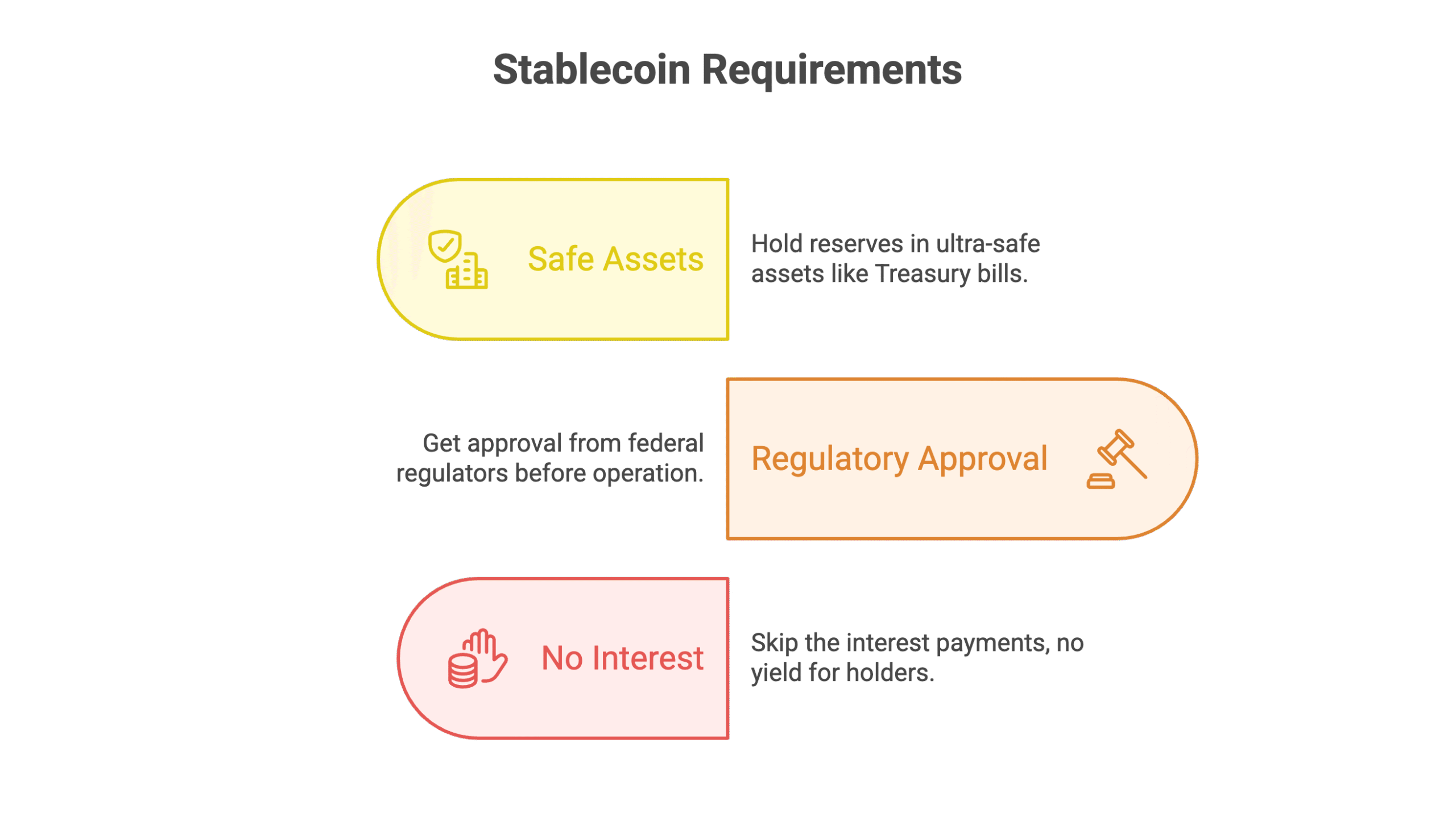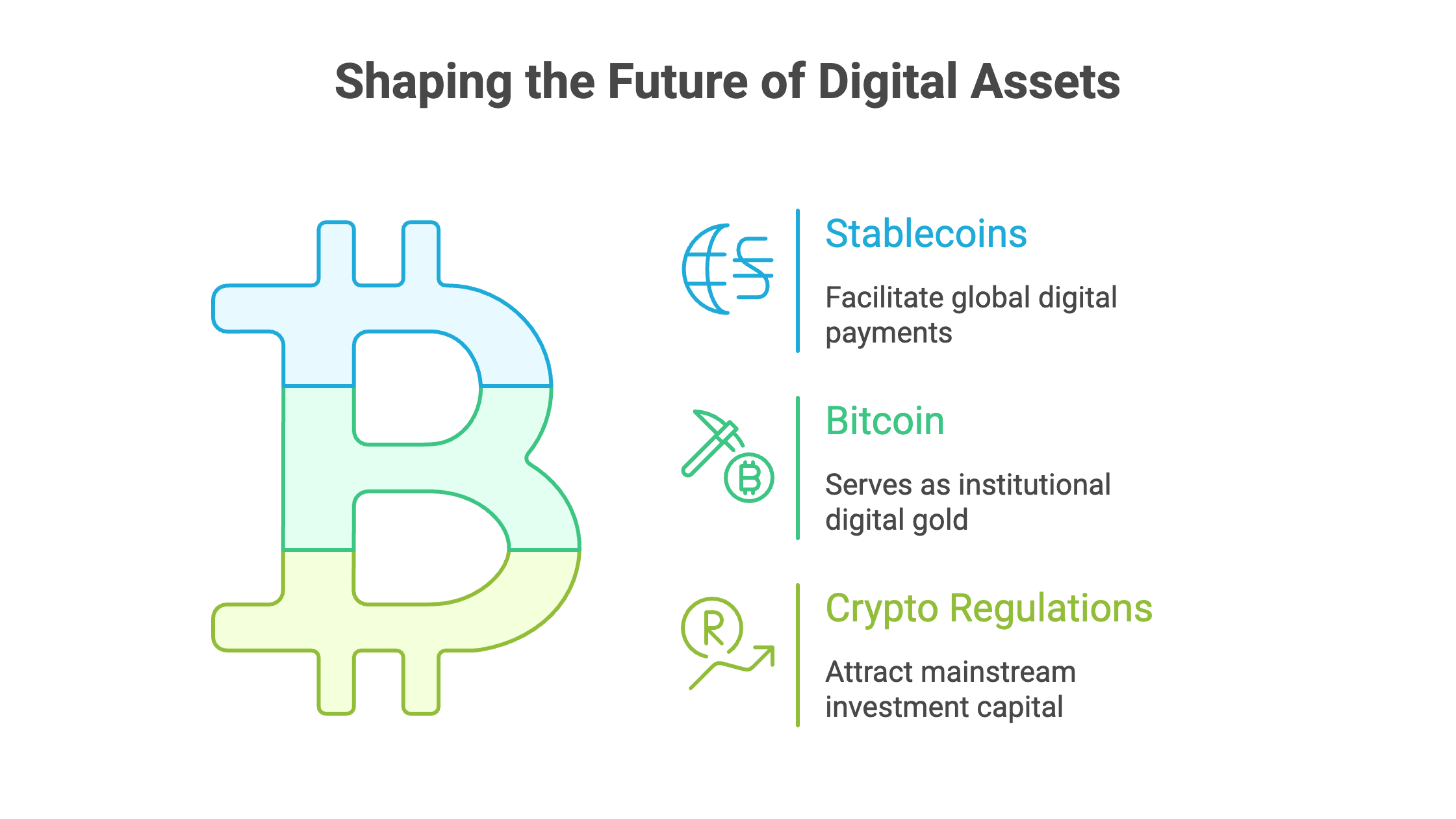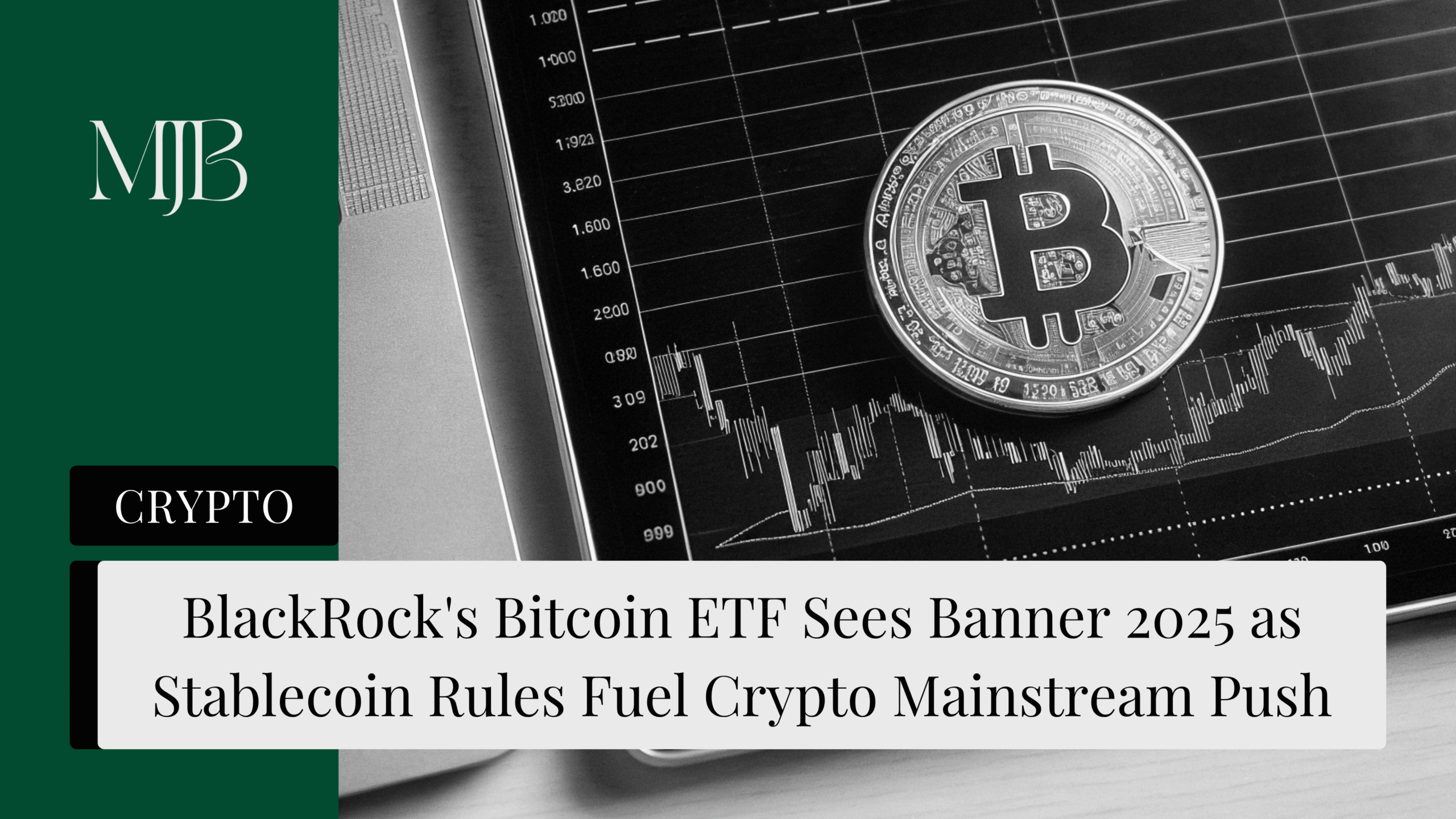Bitcoin ETF inflows are flying with a 25% gain this year, and BlackRock’s IBIT Bitcoin Trust thinks we’re just getting warmed up. The world’s largest asset manager just released some notable bullishness in their latest market commentary, spotlighting how new U.S. stablecoin regulations are setting the stage for mainstream crypto adoption.
Whilst everyone’s still debating crypto’s future, BlackRock sees their bitcoin ETF delivering “pure alpha” and stablecoins becoming the backbone of tomorrow’s financial system. With $250 billion already flowing through stablecoins and fresh crypto legislation clearing the regulatory fog, 2025 could be digital assets’ defining year.
The Genius Act: Stablecoins Get Their Playbook
Stablecoins thus far, have lived their lives in regulatory limbo. Well, those days are over.
The newly passed Genius Act just gave stablecoins official status as payment tools (not investment products). Think of it as crypto getting its driver’s license – suddenly, everything becomes legitimate and scalable.
The rules are pretty straightforward. Stablecoin issuers must:
- Hold reserves in ultra-safe assets like Treasury bills (under 93 days)
- Get approval from federal regulators
- Skip the interest payments (sorry, no yield for holders)
BlackRock loves this move because it strengthens the dollar’s global dominance whilst putting the U.S. at the centre of digital innovation. Smart play.

Bitcoin ETF Performance: BlackRock’s IBIT Leading the Pack
BlackRock isn’t shy about their bitcoin ETF optimism. They’re calling bitcoin a “distinct return driver” – finance speak for “this digital asset prints money differently than everything else.”
The numbers back them up. Bitcoin’s 25% gain this year comes as institutional adoption accelerates and crypto ETF inflows surge. With BlackRock’s IBIT now ranking fourth in U.S. ETF inflows for 2025 at $13.7 billion, we’re seeing the maturation of digital asset investment in real-time.
Major asset managers offering bitcoin ETFs and corporations adding cryptocurrency to balance sheets signal a fundamental shift in how traditional finance views digital assets.
Crypto Investment Strategy: What This Means for Your Portfolio
The stablecoin regulation creates an interesting dynamic for crypto investing. Tether and Circle already hold $120 billion in Treasury bills – just 2% of the total T-bill market. As stablecoin adoption grows, this becomes a bigger piece of Treasury demand.
BlackRock isn’t worried about market disruption, but the math’s worth watching for crypto traders. If stablecoins hit $500 billion (doubling current levels), Treasury bill demand could jump significantly.
For your cryptocurrency portfolio? This regulatory clarity removes a major question mark. Institutional money flows easier when compliance boxes get ticked, particularly for bitcoin ETF investing.
The Bigger Picture: America’s Digital Asset Strategy
These crypto regulations aren’t happening in isolation. Congress is working on broader cryptocurrency legislation to clarify which agencies oversee what parts of the digital asset ecosystem.
BlackRock sees this as America’s play to become the “crypto capital of the world.” Given the firm’s $10 trillion in assets under management and their IBIT bitcoin ETF success, when they talk about cryptocurrency adoption, markets listen.
The emerging framework suggests a future where:
- Stablecoins power global digital payments
- Bitcoin serves as institutional digital gold
- Clear crypto regulations attract mainstream investment capital

Key Takeaways for Crypto Investors
The convergence of regulatory clarity and institutional adoption is creating powerful tailwinds for digital asset investing. BlackRock’s confidence in bitcoin ETF “alpha generation” and stablecoins’ infrastructure role suggests we’re moving beyond speculation into real cryptocurrency utility.
Smart crypto investors should watch how traditional finance continues embracing digital assets. When the world’s largest asset manager calls bitcoin a banner investment and their IBIT ETF attracts billions in inflows, it’s worth paying attention to these crypto market trends.
FAQ
Q1: Will stablecoin regulations hurt crypto innovation?
A: BlackRock thinks the opposite. Clear crypto regulations attract institutional money and reduce regulatory risk. The Genius Act provides a roadmap rather than roadblocks for digital asset adoption.
Q2: Why can’t stablecoins pay interest under the new crypto rules?
A: Regulators want to keep stablecoins as payment tools, not investment products. This prevents them from competing directly with traditional savings accounts and money market funds whilst maintaining crypto market stability.
Q3: How does this affect bitcoin ETF price outlook?
A: BlackRock sees bitcoin ETFs benefiting from broader crypto legitimacy trends. Regulatory clarity typically reduces cryptocurrency volatility and attracts institutional buyers, supporting higher bitcoin prices and ETF inflows.
Q4: Should I expect stablecoins to disrupt Treasury markets?
A: Not likely in the short term. Even at $250 billion, stablecoins represent a tiny fraction of Treasury bill demand. BlackRock expects minimal market impact as the digital asset sector grows.
Q5: What’s next for U.S. cryptocurrency regulation?
A: Congress is working on broader crypto legislation to clarify regulatory oversight across agencies. The goal is making America the global leader in digital asset innovation whilst maintaining financial stability and supporting bitcoin ETF growth.
DISCLAIMER
Effective Date: 15th July 2025
The information provided on this website is for informational and educational purposes only and reflects the personal opinions of the author(s). It is not intended as financial, investment, tax, or legal advice.
We are not certified financial advisers. None of the content on this website constitutes a recommendation to buy, sell, or hold any financial product, asset, or service. You should not rely on any information provided here to make financial decisions.
We strongly recommend that you:
- Conduct your own research and due diligence
- Consult with a qualified financial adviser or professional before making any investment or financial decisions
While we strive to ensure that all information is accurate and up to date, we make no guarantees about the completeness, reliability, or suitability of any content on this site.
By using this website, you acknowledge and agree that we are not responsible for any financial loss, damage, or decisions made based on the content presented.






